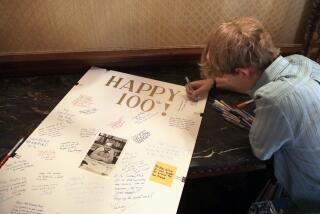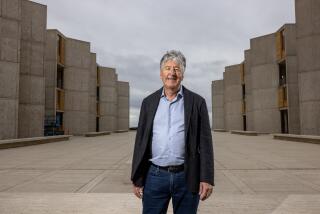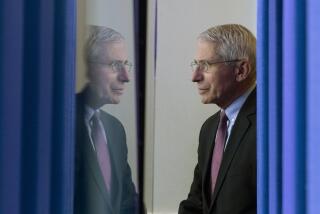Anthony James: Curiosity Drives Scientist
- Share via
Anthony James answered his phone and, responding to a question from a researcher at Harvard, animatedly explained how to dissect a mosquito’s salivary glands.
“It’s a (scientific) network” he explained. “I’m a bit isolated here, but I have my fax, my electronic mail and my phone,” he said about his method of communicating with other scientists in his field.
James, an assistant professor at UC Irvine, spearheads one of five centers in the United States and Crete that are studying ways of controlling diseases by biologically changing the insects that spread them. The five centers are funded by a $2.2-million grant from the MacArthur Foundation of Chicago. The goal of James’ research, a new breed of science, is to genetically alter the mosquito to create a creature that still bites but doesn’t transmit malaria and yellow fever.
James, 39, of Irvine, said he was always curious about people and how things work.
The researcher, one of 10 children born to a black father and a white mother, says that even now he is self-conscious of his mixed heritage. Because of his light complexion, people sometimes ask questions such as “What are you, Italian?”
“It sets the circumstance of profound self-doubt and self-criticism. It’s hard for people to believe that about me, because I’m gregarious and I appear to get by with relative ease. Coming from a big family, I do have the social skills, so it kind of offsets this aspect of growing up in a sort of no-man’s land.”
He also happens to be a scientist who plays rock guitar and has played with rock ‘n’ roll bands from La Mirada to Boston. Although it remains his avocation, vocationally he “went down the road to science,” he said.
A graduate of UC Irvine, James remained there for graduate school and then stayed to teach. In between he was an assistant professor at Harvard.
“It’s true (Harvard) can be a ticket, but it’s like half a ticket,” he said. “You have to supply the rest before it works.”
To James, helping students reach goals is first priority.
“Influencing someone--now that’s a big deal,” he said. “These are the events that you learn to measure as true successes.”
So in addition to teaching, conducting research and supervising six laboratories, James mentors four minority students.
“I give them tools,” he said. “It’s up to them to follow through. If they do, I feel I can get them in anywhere, whether it’s Harvard or anywhere else.”
Grinning, he said: “I live a dual life, a real contrast of scale. On one hand, I’m in an international network of scientists. On the other, I’m dragging kids out of Compton High School who want to be biologists. No one knows the life I lead.”
* Assistant professor of molecular biology and biochemistry
* Mentor for minority high school and college students
* Musician






